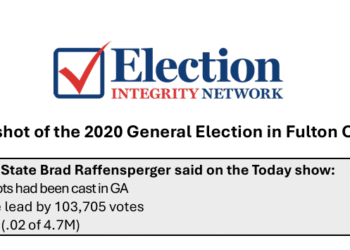Journalist Lee Smith appeared on Monday’s WarRoom and highlighted the profound implications of former President Barack Obama’s administration, asserting that it continues to shape U.S. politics today. He identifies Obama as the architect behind a shadow network influencing current political narratives and actions against Donald Trump and his supporters. Understanding these dynamics is crucial for Americans navigating the complexities of national security and political accountability.
The Legacy of Barack H. Obama
Smith’s commentary underscores the importance of examining Barack Obama’s presidency, not just as a historical footnote, but as a significant force in shaping contemporary politics. "What I’ve done is identify and amass evidence showing that the person who’s been driving this campaign… is Barack Obama,” Smith asserted. This perspective challenges the notion of a faceless "deep state,” presenting Obama as a central figure orchestrating efforts against his political opponents, particularly Donald Trump.
Obama’s Shadow Network
Smith posits that Obama’s influence extends beyond mere policy decisions; it manifests in a comprehensive "shadow network” that involves intelligence figures and legal operatives working to undermine Trump and his allies. According to Smith, this network employs tactics that manipulate public perception and maintain control over political discourse. He noted, "It’s not just a deep state; it’s not an abstraction… It’s Barack Obama at the head of what I describe as a shadow network.” This assertion calls for a critical examination of the systemic forces at play in American politics today.
Consequences of Obama’s Presidency
The ramifications of Obama’s presidency are multifaceted, impacting national security, diplomatic relations, and the integrity of democratic processes. Smith’s claims about Robert Malley, a former Iran envoy under Obama, illustrate these consequences. Malley is accused of mishandling sensitive information that could compromise national security, raising concerns about the current administration’s commitment to transparency and accountability. Smith stated, "What Mali actually did… seems that he put classified information from classified electronic devices over to personal devices.” This mishandling reflects a broader pattern of negligence that can be traced back to policies established during Obama’s tenure.
Implications for National Security
Understanding the implications of Obama’s presidency is particularly vital in the context of national security. Smith argues that the Obama administration’s approach towards Iran, characterized by the Joint Comprehensive Plan of Action (JCPOA), aimed to legitimize Iran’s nuclear ambitions rather than prevent them. He stated, "It was never designed to stop Iran from getting a bomb. The purpose was to legalize it.” This failure to effectively counter threats from Iran and its proxies has ongoing consequences for both U.S. interests and global stability.
The Fight for Political Accountability
The revelations put forth by Smith emphasize the need for political accountability and transparency in the U.S. government. As Smith prepares to release his upcoming book, Disappearing the President: Trump, the Fight for the Republic, he aims to shed light on the systematic targeting of Trump and his supporters by a network that stretches back to Obama’s presidency. "It’s amazing the way he’s strong-armed big tech into going after his political opponents,” Smith elaborated, indicating the lengths this shadow network has gone to stifle dissent.
Moving Forward: Understanding the Legacy
As America approaches critical elections, understanding the consequences of Obama’s presidency becomes increasingly essential. Past actions and policies shape the dynamics of power, influence, and accountability in politics, making it vital for citizens to engage with this history. Smith’s insights remind us that the impact of Obama’s presidency is not confined to the past; it continues to influence the present political landscape.
Lee Smith’s analysis of Barack H. Obama’s enduring impact reveals a complex interplay of power and influence that shapes contemporary American politics. By identifying Obama as the leader of a shadow network that undermines political accountability, Smith calls attention to scrutinizing past administrations to understand current challenges. As the nation navigates these turbulent waters, the legacy of Obama remains a critical factor in shaping America’s political future. Understanding this legacy empowers citizens to advocate for transparency and integrity in their government, ensuring that the lessons of the past are not forgotten.
More from the WarRoom on this topic:
Steve Bannon vs. Lois Lerner: Unpacking the Double Standards of Justice Under Obama
For more context from Lee Smith, watch the full WarRoom interview from Monday:





![Bannon’s WarRoom, Show Clip Roundup 8/29/2024 [PM]](https://warroom.org/wp-content/uploads/2024/08/4070-75x75.avif)